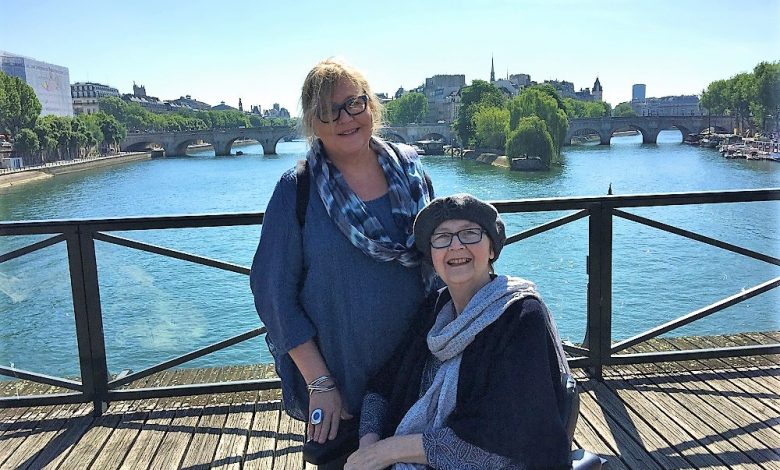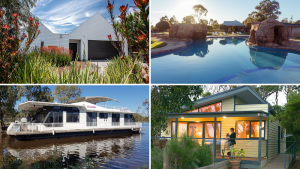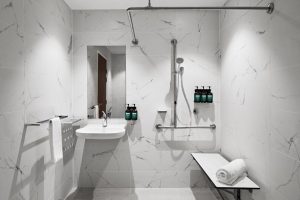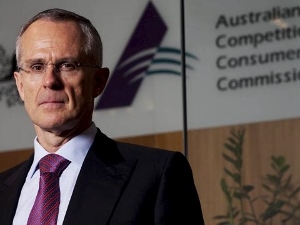
Accessible accom mission goes viral
Exclusive interview: Educating the industry is vital
With a sales and marketing background, a passion for renovating properties, and a love for travel, Kerry Williams decided to launch a powerful website for people with disabilities who want to access and book a holiday, leisure, or respite accommodation.
Talking exclusively with AccomNews, Kerry explains how the online world she created aims to promote improved quality of life for Australians living with disabilities, while also filling rooms for accommodation providers.
Kerry founded both disability-friendly website, Accessible Accommodation as well as its sister website, Accessible Experiences. Like many other great business start-up ideas, this one came from a very personal experience. It was on a trip to Tasmania with her mum, Barbie that Kerry was inspired to challenge old ways of thinking.
She explained: “My mum has a physical disability, and when we travel, I am her holiday carer. Before our trip, I thought I had thoroughly researched the holiday rental property to ensure it would accommodate my mum’s physical challenges. However, it was not as accessible as claimed and, upon arrival, we were disappointed to find that the shower was not accessible.
“But Barbie is a trooper, and she didn’t make a fuss, instead she settled for just a wash, throughout the holiday. I found this experience upsetting. I hated that my wonderful mum suffered this embarrassment, she is everything to me and should never have to compromise!
“This was a lightbulb moment and I set out to make a change because I didn’t want anyone else to have such negative experiences, after all a holiday should be a stress-free time of relaxation.”
When Kerry returned home to Victoria, she modified plans for the holiday rental property she had been building in Barwon Heads and made sure it was fully accessible. While managing this holiday property, her business idea emerged.
“Our accommodation was very popular with guests with disabilities, and they would ask us to recommend other accessible properties. This led to a Facebook group and then we developed the idea of a website that only featured accessible accommodations. We created a portal where all the research and hard work was already done by us.”

Fast forward to today, where the incredibly helpful and innovative Accessible Accommodation website has grown.
It not only gives travellers with disabilities the ability to search for a holiday property that is perfectly suited to their individual needs, but to also make an online booking, just like an online travel agency. More recently, the portal also includes accommodation that offers short to medium-term stays and respite accommodation.
With experience of being both a carer and an accommodation provider, Kerry has a unique perspective in our industry. During COVID, she recognised the urgent need for people with disabilities to book accessible accommodation for medium-term stays.
She explained: “Due to the pandemic, many people with disabilities needed to move from their home environment to isolate and stay safe, for instance, their household may have included a frontline worker or someone who tested positive for COVID. We approached some popular brand hotels where there was less than 10 percent occupancy at that time and we organised medium-term stays in their accessible rooms. This worked brilliantly, it was a win-win for everyone.”
There are many other instances when accessible accommodation is sought.
Kerry revealed: “Do you know that many NDIS participants have up to 28 days respite available to them? They are keen to book accommodation, but NDIS only pays on departure, which puts many operators off. To resolve this, our booking service can secure payments and, in some cases, pay for the accommodation in advance.
“There are other times when people with newly acquired disabilities may want to stay somewhere from between three to six months while their home is being modified.”
Kerry has identified huge opportunities for the sector to market accessible accommodation to people with disabilities, but she suggests fear is holding operators back.
She said: “The main worry is that rooms aren’t good enough and this will lead to bad reviews. It is because many operators do not fully understand disability or even what accessibility means. But when you consider that 19 percent of people in Australia have a disability and 40 percent of those also travel with carers or support workers (resulting in more than one room being booked) operators are losing out on an incredible business opportunity.
“Many operators consider their accessible room as a ‘token gesture’ or even a ‘last resort’ – a room for people without disabilities when other rooms are fully booked. I want to flip this mindset. I point out that when a person with a disability books a room, it is likely that the total occupancy level of the entire property may also increase.
“Also, remember the growing number of cashed-up baby boomers are also seeking the convenience of easy access and a step free shower. It just makes good business sense to make the most of your accessible facilities and to market them well.”
The number of people with disabilities who use this portal has grown exponentially and their glowing reviews reveal how much they trust Accessible Accommodation. For accommodation providers wanting to join they are required to answer a detailed questionnaire giving essential accessibility information, but this also saves them booking and reservation time in the long run.
Until Accessible Accommodation came along, travellers with disabilities complained of being faced with inaccurate or incomplete information from hotel websites and OTAs. Now Kerry says her aim is for Australia and New Zealand to be the best accessible destinations globally.
“Currently there is no regulation in tourism accommodation for accessibility (only building codes) and therefore Accessible Accommodation has created a three-tiered accessible qualified program. “Providers don’t need to meet all three tiers, because not everyone is a wheelchair user. But we can match people with all sorts of different needs to the most suitable accommodation.”
Kerry would like to see all operators take the step to audit the accessibility of their accommodation.
She says it doesn’t have to cost the earth to provide simple accessible solutions and she provides a consulting service for properties applying for grants, renovations, and new builds. For an existing property wanting to list with the website, she can also provide feedback.

For AccomNews readers, she offers some simple accessibility tips:
- Walk around your property to identify any steps, even small lips.
- Hire a wheelchair and use it to get around your property, this will quickly reveal just how accessible it really is. It might be the best $30 you ever spent.
- Take accessibility equipment out of storage so that it can be used. Some accommodations have a swimming pool hoist hidden away in a shed, get it out and leave it near the pool ready for use.
- A simple furniture declutter throughout your property or in your accessible guest room may be all that is required.
- If your bathroom or shower is not step free there may be some simple inexpensive solutions (from a local hardware store) that do not require any expensive building work.
- If you are designing an accessible bathroom it doesn’t need to look like a hospital facility. The best feedback from guests comes from a bathroom with beautiful tiles, a frameless open shower and classy grabrails.
What’s next for Kerry?
“Now Australian Tourism Data Warehouse has included our three-tiered rating system in their certification section, and received our certificate and can now tick what level of mobility they provide, I am working to get all tourism bodies to embrace our three-tiered rating system as there is no real regulation for the tourism industry,” she said.
“I will continue to strive to challenge attitudes. People with disabilities are just like any other guests. I want to educate the industry that they don’t need to treat anyone as ‘disabled’, and there is no extra work other than to provide a good customer service.
“It is important for managers to ask all guests about their accommodation experience and ask what they would like to see improved. Guests with disabilities want to be heard just like every other guest and they will appreciate genuine interest.
“Educating the industry is vital and we are launching an e-learning module in February that anyone can sign up for.”
Finally, Kerry reminded us: “Disability doesn’t discriminate, it can happen to anyone.”
Mandy has over 17 years of accommodation and tourism industry writing experience and is Editor of AccomNews & Resort News, Publisher of SchoolNews & Director of Multimedia Pty Ltd. She is a retired registered nurse with a 25-year NHS career that followed a few unforgettable years in hotel housekeeping.






